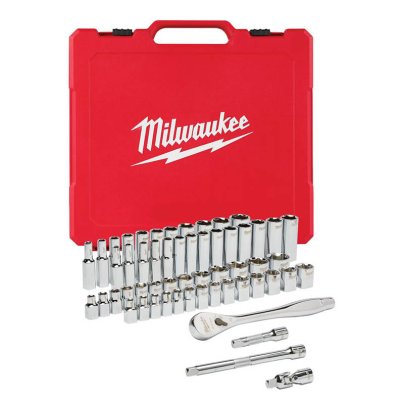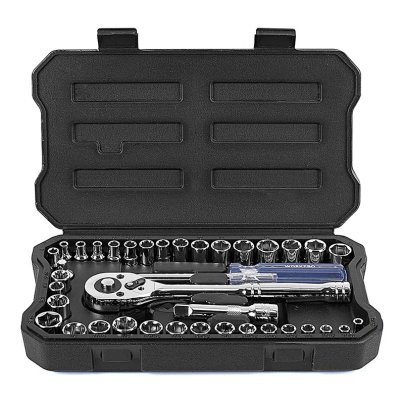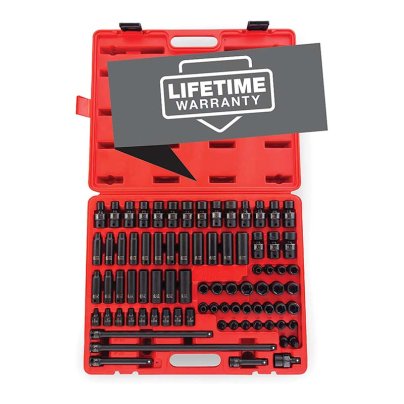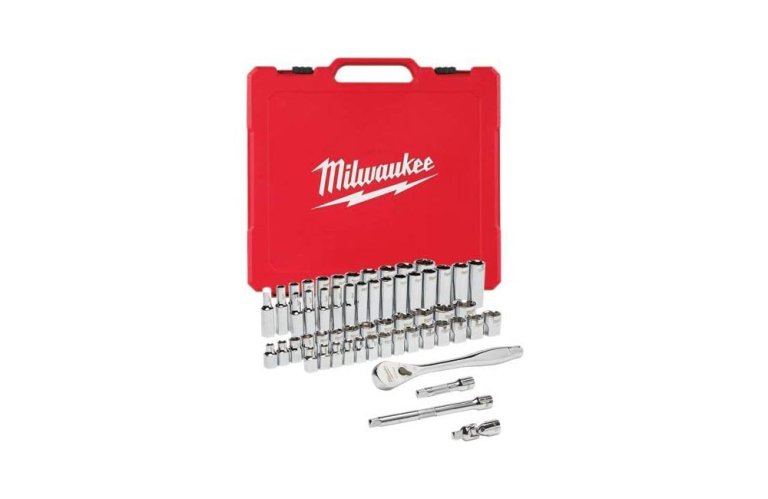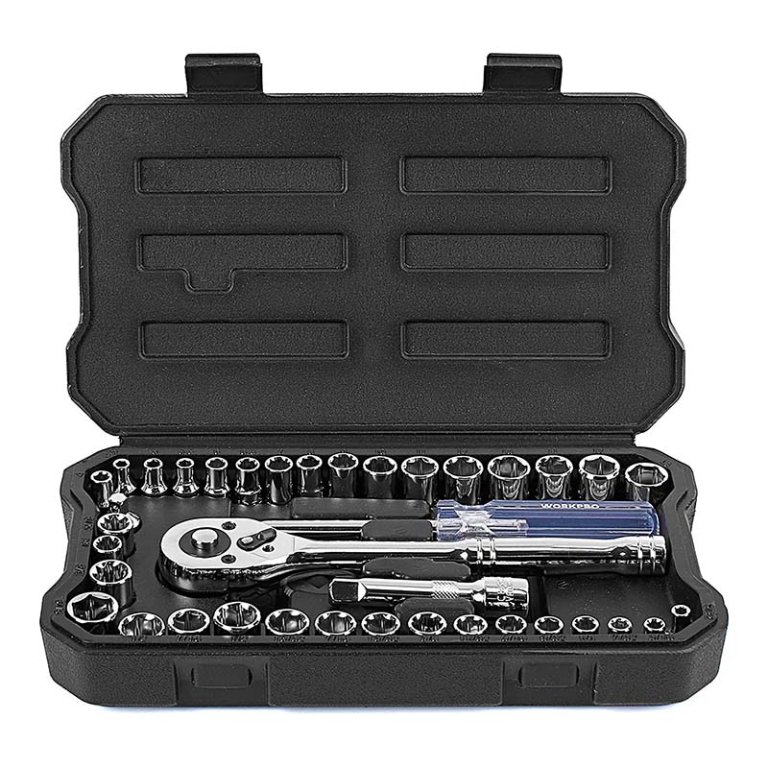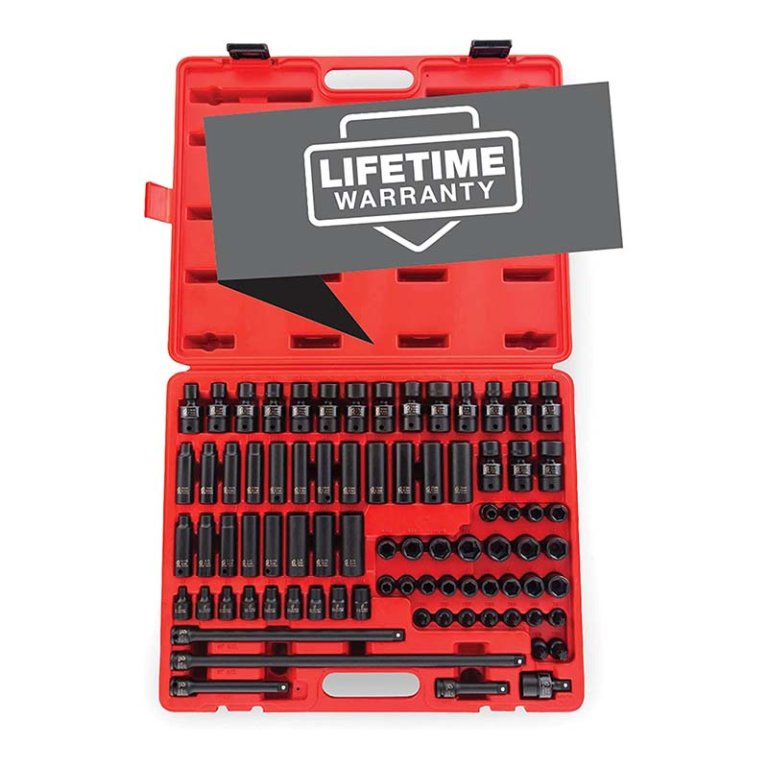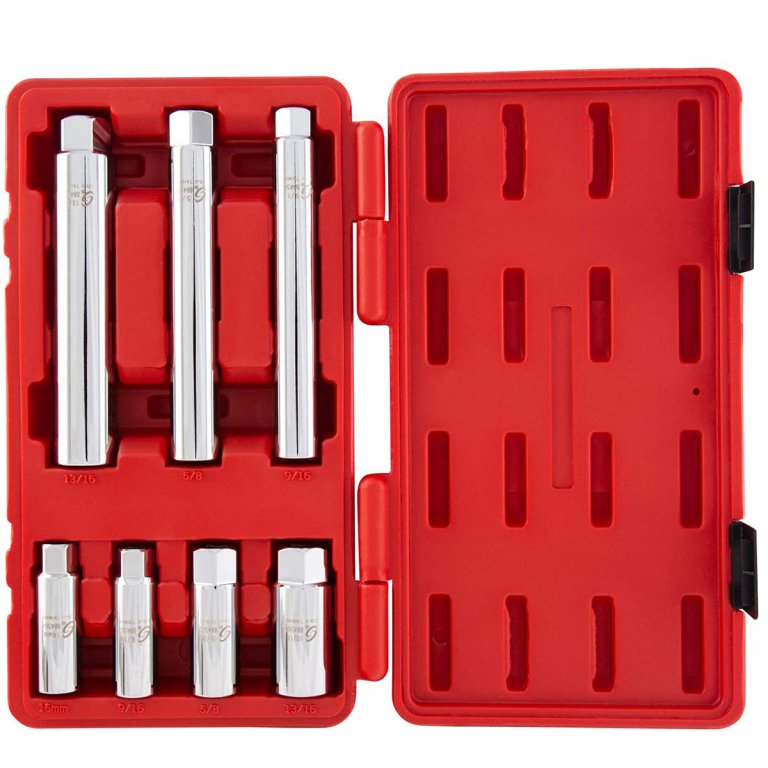
We may earn revenue from the products available on this page and participate in affiliate programs. Learn More ›
Socket sets allow you to tighten and loosen fasteners with a speed and ease that isn’t possible with traditional wrenches, making them essential tools for automotive or maintenance work. But choosing the best set of socket wrenches can be difficult since they vary in price and quality. To help guide your selection, we reached out to an expert for their insights into what makes a good socket wrench and put seven top socket sets through demanding hands-on testing.
Based on our research and tests, we chose the Milwaukee ⅜” Drive 56-Piece Ratchet & Socket Set as the best overall socket set for its quality construction and excellent versatility. However, there was a lot to like about the rest of the sets that made our list, which represent some of the top tools available in their respective categories. Whether you’re a DIYer or a professional in the home or automotive space, we stand behind the products below as some of the best socket sets available.
- BEST OVERALL: Milwaukee ⅜” Drive 56-Piece Ratchet & Socket Set
↓ Jump to Review - BEST BANG FOR THE BUCK: WorkPro 39-Piece Drive Socket Wrench Set
↓ Jump to Review - UPGRADE PICK: Sunex Tools 3580 ⅜” Drive Master Impact Socket Set
↓ Jump to Review - BEST FOR SPARK PLUGS: Sunex Tools 8845 ⅜” Drive 7-Piece Spark Plug Socket Set
↓ Jump to Review - BEST FOR LARGE SOCKETS: Neiko 02448A ½” Drive Master Impact Socket Set
↓ Jump to Review - BEST TORX BIT SET: Neiko Master Torx Bit and External Torx Socket Set
↓ Jump to Review
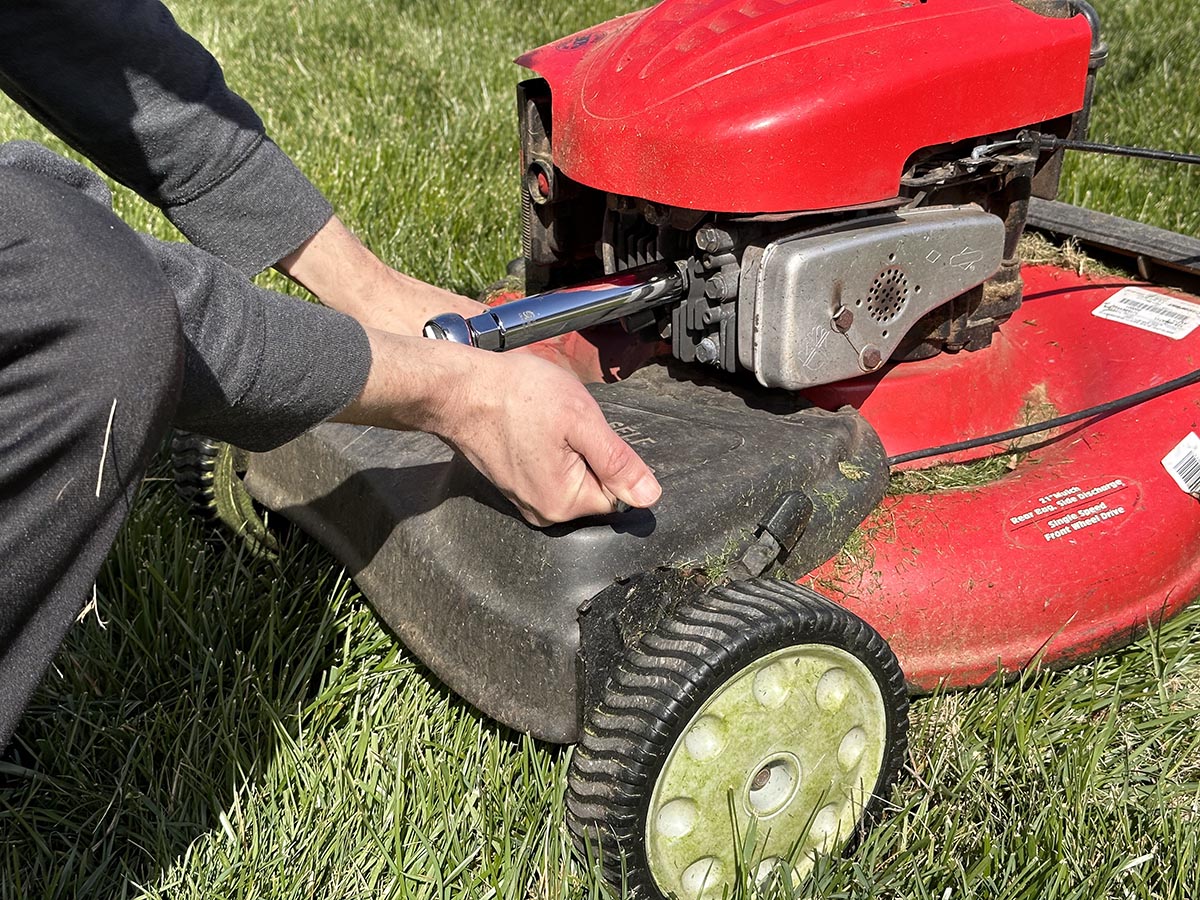
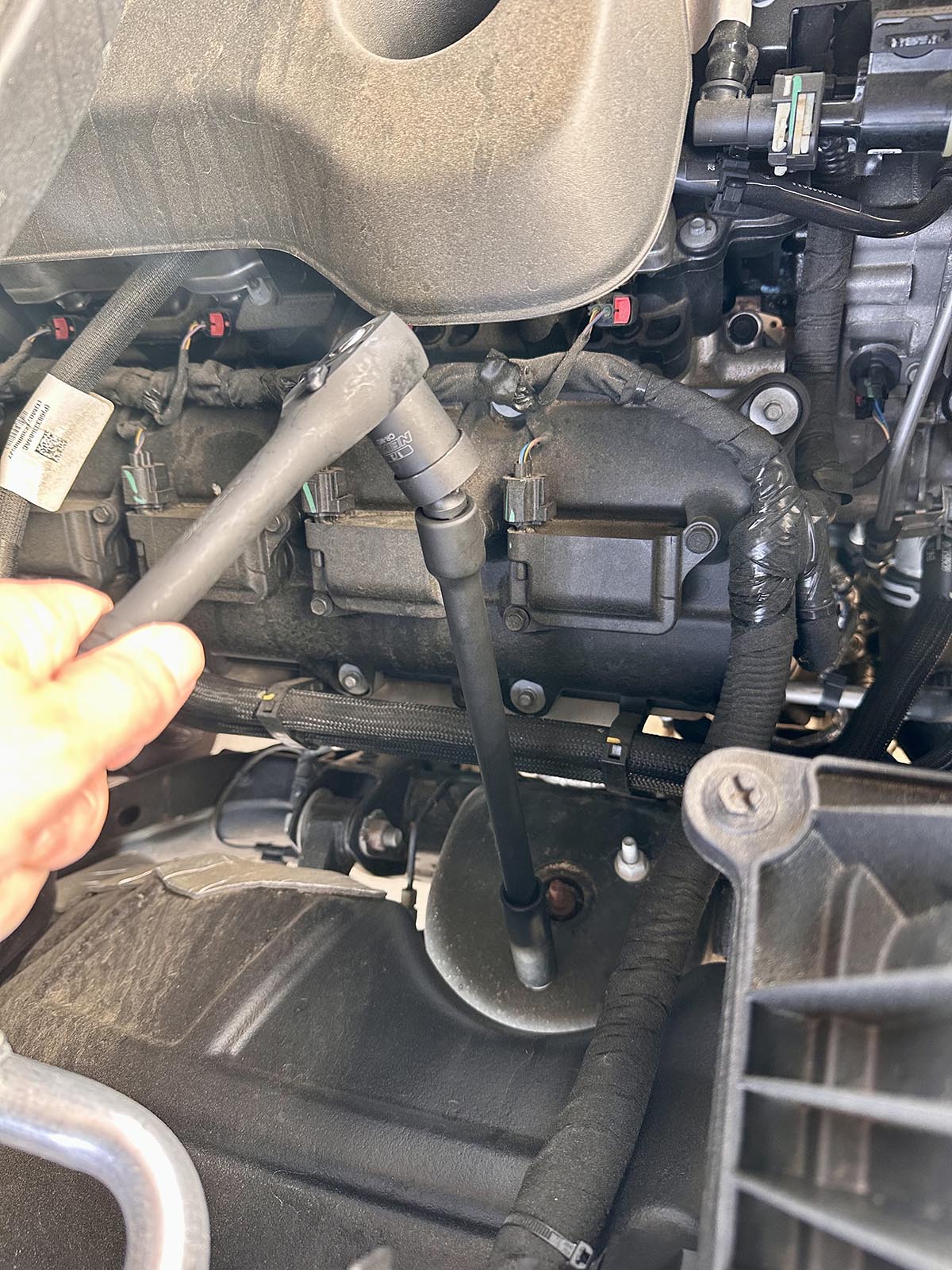
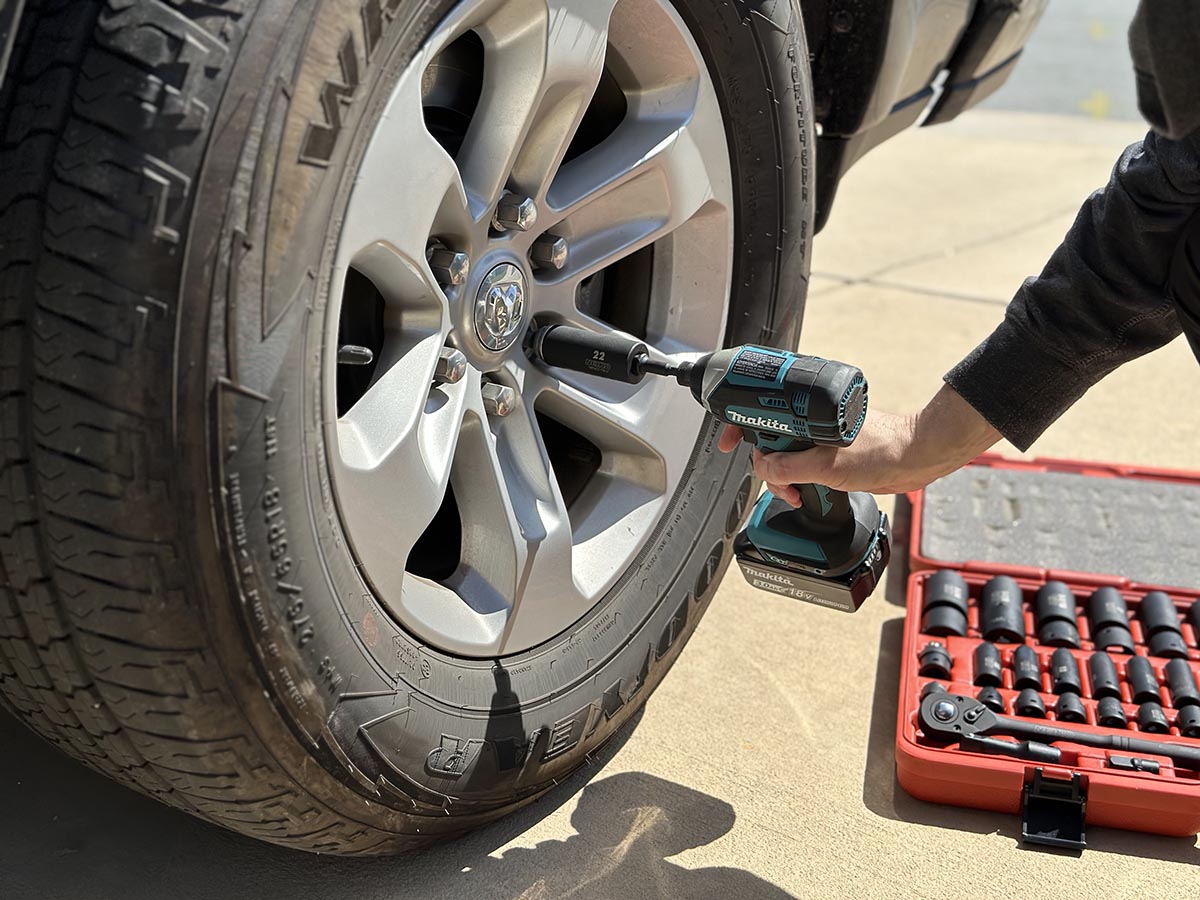
| Product Name | Pieces | Finish | Drive Size |
| Milwaukee ⅜” Drive 56-Piece Ratchet & Socket Set | 56 | Chrome | ⅜ inch |
| WorkPro 39-Piece Drive Socket Wrench Set | 39 | Chrome | ¼ inch and ⅜ inch |
| Sunex Tools 3580 ⅜” Drive Master Impact Socket Set | 80 | Black oxide | ⅜ inch |
| Sunex Tools 8845 ⅜” Drive 7-Piece Spark Plug Socket Set | 7 | Chrome vanadium | ⅜ inch |
| Neiko 02448A ½” Drive Master Impact Socket Set | 65 | Carbonized vanadium steel | ½ inch |
| Neiko Master Torx Bit and External Torx Socket Set | 60 | S2 alloy steel chrome | ¼, ⅜, and ½ inch |
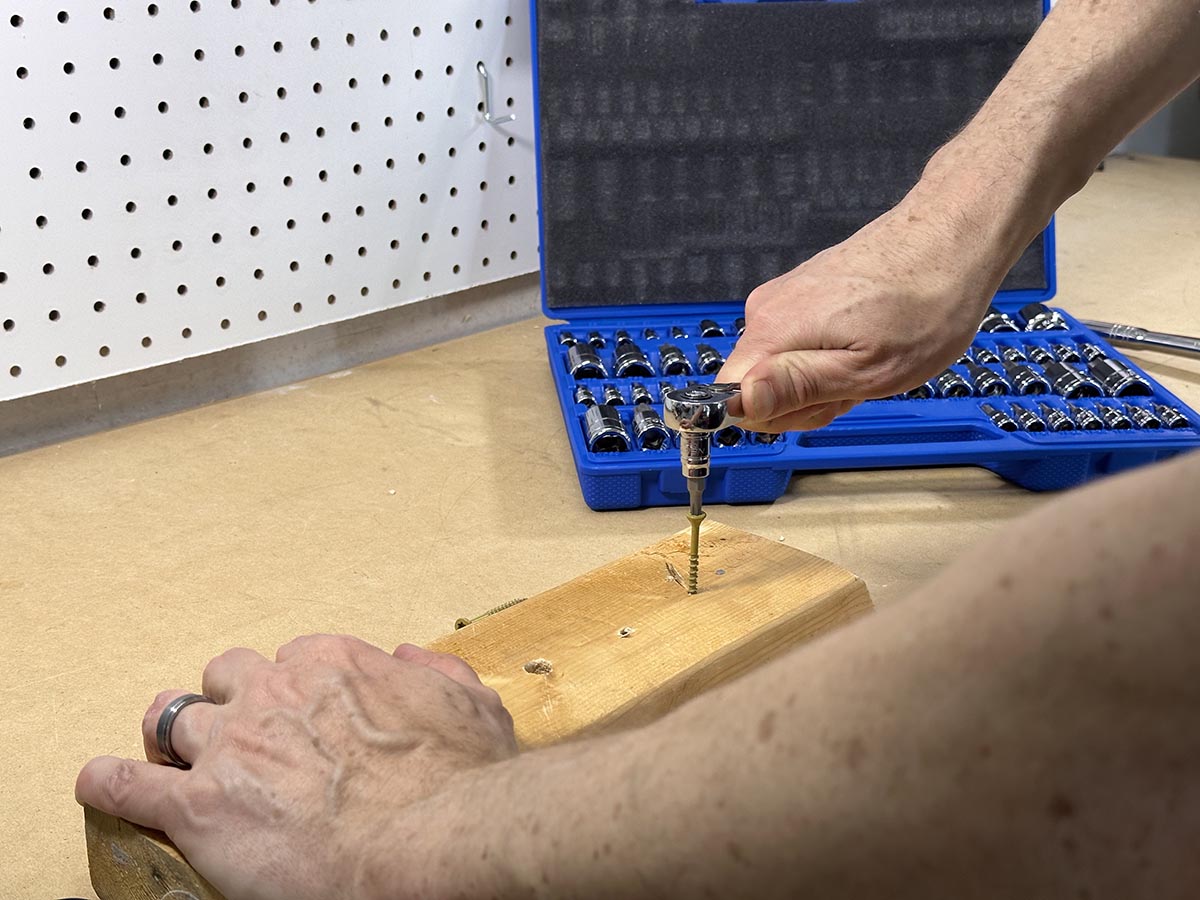
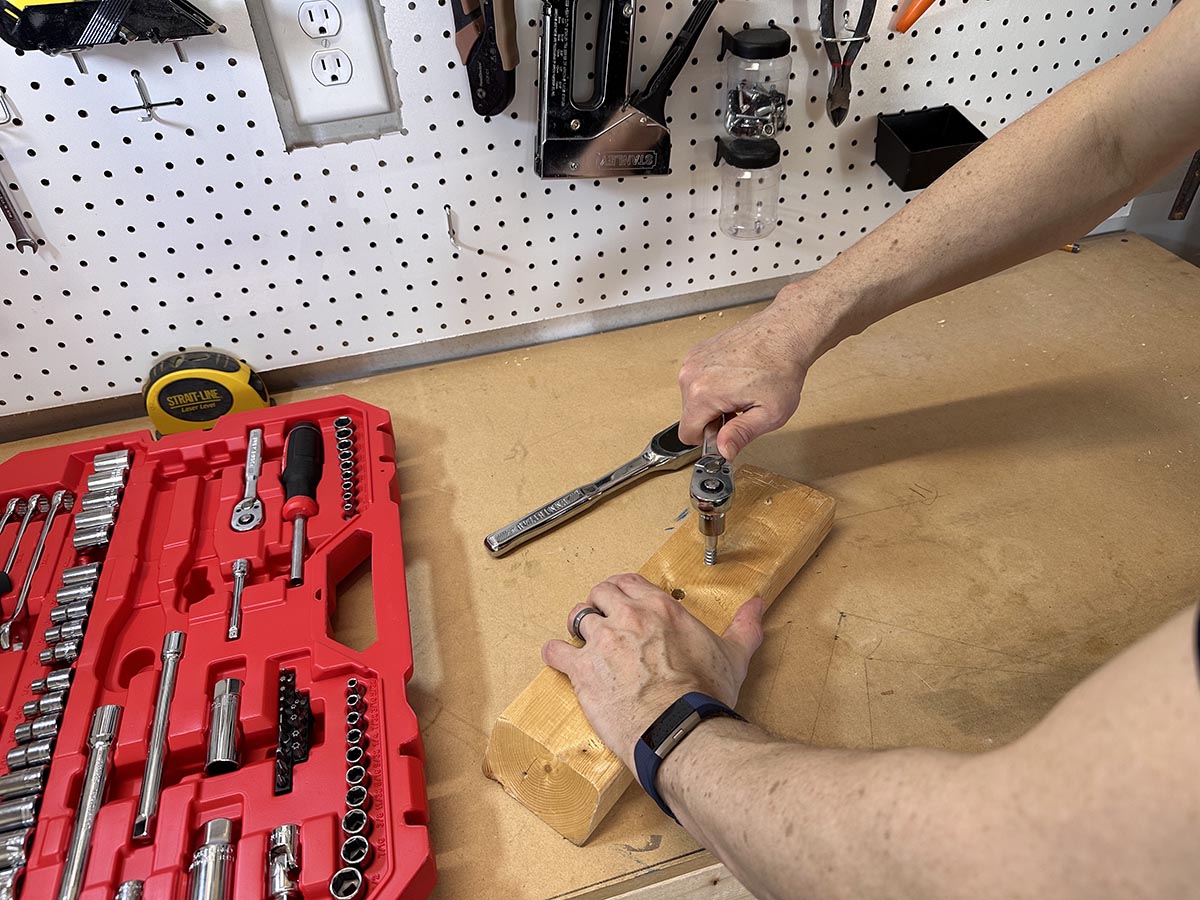
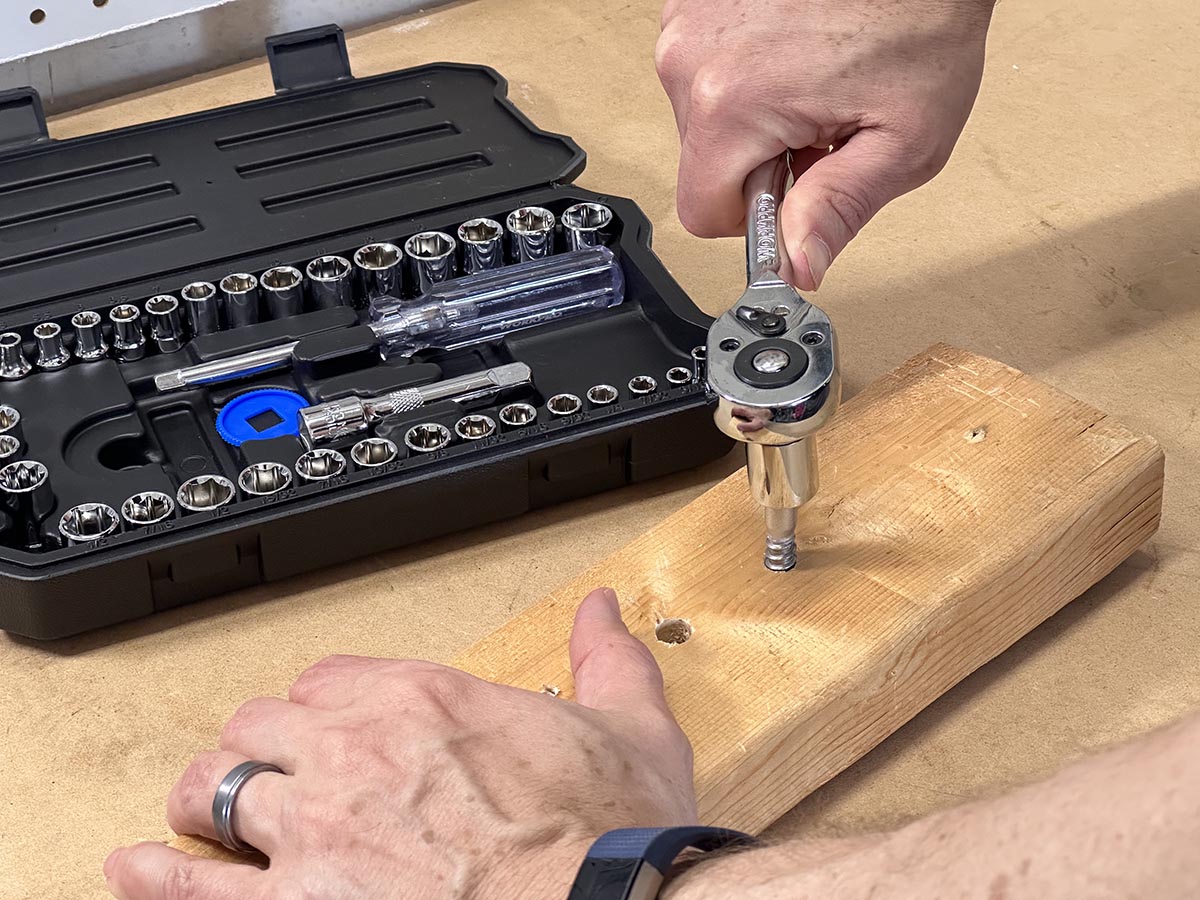
Our Top Picks
The top-rated products below are some of the best socket sets on the market based on quality, price, reputation, and our hands-on tests. Any of these socket sets would be an excellent addition to your automotive garage or workshop.
Best Overall
Milwaukee ⅜" Drive 56-Piece Ratchet & Socket Set
What We Like
- Flat sides prevent sockets from rolling away
- 90-tooth ratchets great for tight spaces
- Durable heavy-gauge construction
What We Don’t Like
- Small socket set compared to other options
Product Specs
- Pieces: 56
- Finish: Chrome
- Drive size: ⅜ inch
One of the best reasons to invest in a socket tool is to be able to perform basic automotive repairs at home. Since this set from Milwaukee comes with both 8-inch and 12-inch-long ⅜-inch socket wrenches, it offers excellent versatility for that task and others. The longer wrench provides more torque for stubborn bolts while the shorter one will fit easily into tighter spaces. Multiple extension bars and a universal joint add additional help for users needing access to hard-to-reach fittings.
While this set isn’t particularly large, it includes the sizes you’ll use most often. There are 13 shallow Society of Automotive Engineers (SAE) sockets, 11 deep SAE sockets, 14 shallow metric sockets, and 14 deep metric sockets. The sockets all have a four-sided shape versus a round one, which prevents them from rolling away and allows you to use them with a transitional monkey wrench or crescent wrench to create more torque. We also like that the handle is oblong, which makes the ratchets comfortable to grip even when applying a lot of force. The case even has a nice design, as it includes a removable tray that made it easier to keep the entire set right beside us during testing.
Read our full review: Milwaukee ⅜” Drive 56-Piece Ratchet & Socket Set
What our tester says: “We expect quality with any Milwaukee tool, and this socket set didn’t disappoint. The sockets feel thicker and heavier than less expensive sets. We also like that the ratchets have 90 teeth, which makes stopping points much closer together than many other options, allowing us to loosen bolts even when there’s not much room to turn the ratchet handle.”—Tony Carrick, Product Reviews tester and writer
Get the Milwaukee socket set at Amazon, Ace Hardware, The Home Depot, Walmart, or Northern Tool + Equipment.
Best Bang for the Buck
WorkPro 39-Piece Drive Socket Wrench Set
What We Like
- Comes with an adapter for ¼-inch sockets
- Has both metric and SAE sizes
- Includes a 3-inch drive extension bar
- Spin disk removes loosened nuts quickly
What We Don’t Like
- Not suitable for impact drivers
Product Specs
- Pieces: 39
- Finish: Chrome
- Drive size: ¼ inch and ⅜ inch
This 39-piece socket set from WorkPro includes just enough sizes to handle most odd jobs around the house, making it ideal for anyone who isn’t looking for a set to work on cars but might need that functionality occasionally. The size selection is limited to mainly smaller sockets, with 28 ¼-inch sockets (15 SAE and 13 metric) and six ⅜-inch sockets (three SAE and three metric). There’s also a 3-inch extension bar, a spin disk for quickly removing nuts that have already been loosened, and a socket spinner shaped like a screwdriver but that adapts to sockets. All tools have a rust-resistant chrome finish and fit neatly into the included case.
When testing, we liked the sturdy feel and handle length of the ⅜-inch ratchet. However, the sockets in this budget-friendly set are notably lighter with thinner walls than other full sets we tested. Though they likely wouldn’t survive intense pressure, they’re definitely strong enough to handle the lighter-duty jobs. They held up just fine when working the ratchet to drive the bolt into wood in our lag bolt test.
Get the WorkPro socket set at Amazon or WorkPro.
Upgrade Pick
Sunex 3580 ⅜" Drive Master Impact Socket Set
What We Like
- Enough strength for high-torque impact drivers
- SAE and metric sockets in standard, deep, and universal lengths
- Includes 3-, 5-, 10-, and 15-inch extension bars
What We Don’t Like
- Rubber gasket might not always hold the spark plug
Product Specs
- Pieces: 80
- Finish: Black oxide
- Drive size: ⅜ inch
You’d be hard-pressed to find a more versatile collection of ⅜-inch drive sockets than this set from Sunex. The 80-piece kit includes 23 SAE sockets divided into eight standard sockets, six deep sockets, and nine swivel-joint sockets. It also has 34 metric sockets with 12 standard, 12 deep, and 10 universal sockets in the most common sizes. There are also nine Torx bits and nine external Torx sockets, making this setup ideal for anyone working on motorcycles or cars that use this bolt style, such as those from BMW, Mercedes, and Ford.
Like other impact driver sets, this Sunex Drive Master socket set is made from forged molybdenum with a black-oxide finish, making it stronger and better able to withstand the torque created by an impact driver than the standard shiny chrome steel of other socket sets. Additionally, the pieces in this extractor socket set are noticeably thicker (and heavier) than other sets we tested, giving them a durable feel. Each socket also fit snugly onto each bolt—we experienced no slipping, and the extenders and joints all connect tightly together. The sockets fit nicely into a rugged red plastic storage case for easy transport.
What our tester says: “Working on a car often means working in tight spaces, so we love the fact that this set also includes 16 swivel-joint sockets of varying sizes along with 3-, 5-, 10-, and 15-inch extension bars. This is truly a set designed for serious or professional mechanics. The only thing we wish the set would include is a ⅜-inch driver.”—Tony Carrick, Product Reviews tester and writer
Get the Sunex 3580 socket set at Amazon, The Home Depot, or Walmart.
Best for Spark Plugs
Sunex 8845 ⅜" Drive 7-Piece Spark Plug Socket Set
What We Like
- Multiple sizes for a broad range of spark plugs
- Works on chainsaws, trimmers, leaf blowers, and cars
- 1/2 with standard lengths as well
- Made from thick chrome-vanadium steel
What We Don’t Like
- Does not come with a wrench
Product Specs
- Pieces: 7
- Finish: Chrome vanadium
- Drive size: ⅜ inch
Excellent build quality and a great mix of socket sizes and lengths make this one of the best spark plug sets we could find. The Sunex ⅜-inch drive set is similar to other sets we reviewed in that the sockets consist of high-quality chrome-vanadium finish. But when we compared the Sunex set with other brands, we found Sunex uses thicker metal, making this set less likely to crack or bend.
With seven sockets, this set is also more versatile than other sets we tried. There are three standard SAE, with sizes of 9/16 inch, ⅝ inch, and 13/16 inch; one standard 16-millimeter metric socket; and three extra-deep 6-inch-long SAE sockets, with sizes of 9/16 inch, ⅝ inch, and 13/16 inch. The smaller sizes are ideal for removing spark plugs from lawn mowers, leaf blowers, and chainsaws, while the standard ⅝-inch socket will fit most spark plugs found on cars and trucks. Like other spark plug sockets, each has a rubber retaining ring that fits over the spark plug tip so you can pull the spark plug out after loosening it. The set also comes with a rugged case for safe storage.
What our tester says: “We appreciate that this kit comes with three 6-inch-long deep sockets, which are significantly longer than most spark plug sockets. We were able to reach a spark plug inside a car engine without having to use an extender.”—Tony Carrick, Product Reviews tester and writer
Get the Sunex 8845 socket set at Amazon or The Home Depot.
Best for Large Sockets
Neiko 02448A ½" Drive Master Impact Socket Set
What We Like
- Thicker carbonized metal can handle tremendous pressure
- Standard and deep sockets for all included sizes
- Carry case has slots for easy socket removal
What We Don’t Like
- Only has larger size sockets
- Finish leaves a black film on hands
Product Specs
- Pieces: 65
- Finish: Carbonized vanadium steel
- Drive size: ½ inch
With its heavy-duty construction and broad range of larger socket sizes, the Neiko 65-piece impact socket set is ideal for working on lug nuts and other large fasteners you’d typically wrestle with on a car. Imperial socket sizes range from ⅜ inch up to 1¼ inches, while metric sizes range from 10 to 24 millimeters. Since this is a socket set for impact drivers, we weren’t surprised to find the sizes all on the large end, but if this is your only socket set, you would have to look elsewhere for smaller sockets.
In addition to standard and deep sockets for all included sizes, this large socket set has a nice range of extenders and joints that make it easier to work bolts located in the deeper recesses of a car engine. The sockets didn’t threaten to pull off the ratchets or extender even while going full bore with our impact driver. We also really like this set’s case, which isn’t the standard molded plastic version. Instead of snapping into place in a socket set organizer, the bolts sit in a tray, making them much easier to remove and put back. The only gripe we have about this set from Neiko is the amount of black residue that rubbed off the tools and onto our hands while using the sockets, but some degree of that is to be expected from carbonized steel.
What our tester says: “Thanks to their thick and heavy build, we didn’t experience any cracking or popping out while removing 22-millimeter lug nuts from a truck rim. We also liked how the sockets, extenders, and ratchets all lock into each other, ensuring they keep their connection even under intense torques.”—Tony Carrick, Product Reviews tester and writer
Get the Neiko 02448A socket set at Amazon, Lowe’s, or Walmart.
Best Torx Bit Set
Neiko Master Torx Bit and External Torx Socket Set
What We Like
- Well suited for multiple drive sizes
- Designed specifically for a variety of Torx fasteners
- Labeled case keep sockets neatly organized
What We Don’t Like
- Does not include a socket wrench
- Only useful for Torx fasteners
Product Specs
- Pieces: 60
- Finish: S2 alloy steel chrome
- Drive size: ¼, ⅜, and ½ inch
If your home mechanics jobs involve working on motorcycles or BMWs, Mercedes, and Ford automobiles, then you’ll need good Torx sockets like those in this Neiko set to get the job done. This chrome-plated Torx socket set includes a broad range of sizes, including five ¼-inch, five ⅜-inch, and four ½-inch sockets. It also comes with 17 Torx bits with ten ¼-inch, five ⅜-inch, and two ½-inch bits, plus 17 security Torx bits (ten ¼-inch, five ⅜-inch, and two ½-inch) for Torx screws that have a raised security pin. For high-torque applications, there are 12 Torx Plus bits: seven ¼-inch, four ⅜-inch, and one ½-inch bit. All of these pieces fit neatly into a durable case for organized transportation.
In short, this is one of the most impressive collections of Torx socket sizes we could find. The only thing missing is ratchets, though those with a standard hex socket set probably already have a ¼-inch, ⅜-inch, and ½-inch driver to use with this one. Apart from its variety of sizes, this set’s most notable feature is its alloy-steel-chrome construction, which prevents the bit heads from stripping or wearing even under heavy torque. We also liked the heavy feel and thicker steel construction of these sockets, which translate into more power and less chance of cracking.
Get the Neiko Master Torx socket set at Amazon or Walmart.
Jump to Our Top Picks
How We Tested the Best Socket Sets
Before choosing which products to test, we researched and reviewed dozens of possible options, looking for those that stood out based on the number of pieces in the set, durability, versatility, and special features. We then put each of our selections through rigorous testing, using them to work bolts, spark plugs, and lug nuts on our vehicle. During our evaluation, we considered ease of access for hard-to-reach bolts, how well the sockets fit on the bolt heads, and how easy the tools made it to remove stubborn bolts. We also subjected our sockets to high torques to see if they could withstand heavy pressure without cracking.
Types of Sockets
It is important to know the type of socket you need for your project before purchasing a socket set. Otherwise, you may get a set that doesn’t have what you need. Common socket types include SAE, metric, Torx bit, impact, driver, pass-through, and spark plug.
SAE
SAE sockets are primarily designed for work on American-made products that use the imperial system of measurement (inches and fractions), though you will sometimes see metric measurements alongside SAE ones in places where the two coincide. SAE sockets come as regular sockets, impact sockets, pass-through sockets, and spark plug sockets, among others.
Metric
Metric sockets are the same as SAE sockets in that they are not a type of socket but a measurement system grouping them. These sockets use millimeters and are great for working on imported cars that may have bolts that correspond better to a metric socket than an imperial socket. Metric sockets include all the same socket types as SAE sockets.
Torx Bit
External Torx sockets are used for 6-pointed star Torx-style fasteners, and Torx bits are specifically designed for use with Torx screws, which have a 6-pointed star- shape impression and may have a raised security pin that requires a security Torx bit. These bits can connect to regular ratchets but give you more torque to tighten or loosen Torx screws. Torx Plus bits have a thicker wall and are made for high-torque situations. However, if you are not working with Torx screws, these bits are not that useful.
Impact
Impact sockets are designed for use with impact drivers that put more torque and power into the bit than a human can produce. Due to this stress, impact bits have thicker walls and a noncorrosive finish to handle increased power and vibration. These sockets have an industrial finish that makes them black instead of the polished chrome you see with other sockets.
Driver Bit
Driver bits are similar to the Torx bits in that they are not true sockets. Instead, a driver bit will correspond to a screw head type and size, including flat or slotted, Robertson or Phillips. These bits fasten to regular ratchets to provide extra torque when loosening or tightening a screw but will only work in the specific screw they are designed to fit.
Pass-Through
Pass-through sockets are handy for removing or fastening bolts or studs with long shafts. A hole in the middle of the socket allows the shaft to pass through the socket and ratchet so it’s easier to thread the shaft through the socket to reach the nut.
When tightening with a pass-through socket, you can continue tightening the bolt as the shaft passes through the socket and ratchet, allowing you to tighten the nut completely without needing a wrench. However, you need a pass-through ratchet to use a pass-through socket, so be sure to get a set with both.
Spark Plug
Spark plug sockets are used to remove or fit spark plugs. They are much longer than standard sockets because spark plugs are often located in difficult-to-access areas in the engine.
These sockets sometimes have a rubber insert to prevent the spark plug from being damaged during removal or installation. Spark plug sockets are necessary tools for automotive professionals, but DIYers who enjoy getting under the hood of their cars would also benefit from having a set.
What to Consider When Choosing a Socket Set
Before choosing a tool kit for your workshop, it’s smart to take a few minutes to educate yourself on the most important shopping considerations, which pertain predominantly to size, shape, and durability.
Drive Size
The drive size of the socket refers to the opening on the top of the socket that attaches to the ratchet. This opening comes in three drive sizes: ½ inch, ⅜ inch, and ¼ inch.
- ½-inch drive-size sockets are for high-torque applications like automotive wheel replacement and using a breaker bar. This size of the drive socket isn’t the best for all-purpose jobs because the socket selection is lower with this drive size, but you can use them with any ratchet size if you have an adapter.
- ⅜-inch drive-size sockets are the most common and most available. They are used in many different industries and DIY projects, from assembling a gazebo to working on a bicycle. Sockets with a drive size of ⅜ inch tend to be more affordable at a higher quality than either the ½-inch or the ¼-inch sizes.
- ¼-inch drive-size sockets are ideal in tight spaces or when working with recessed nuts. While ½-inch sockets give you extra power, ¼-inch sockets are designed for accessibility. However, using a socket with a ¼-inch drive size can take longer since you have less power and torque.
Shallow vs. Deep Sockets
Standard sockets can come in both shallow and deep versions of the same size to allow you to work with any nut-and-bolt configuration. Both types are usually included in an all-purpose socket set.
- Shallow sockets are for working with nuts that sit less than an inch from the end of the shaft and are the most frequently used for nonautomotive purposes. These sockets can be attached to regular ratchets, making it quick to work with shallow nuts instead of lining up a deep socket.
- Deep sockets are for reaching nuts that sit farther down the bolt shaft. The sockets are a step away from pass-through sockets, allowing you to use a normal ratchet to reach deeply driven nuts. However, if a deep socket hits the end of the shaft before reaching the nut, a pass-through socket and ratchet will be necessary.
Shape
The shape of the socket falls into two main categories: 6-point sockets and 12-point sockets.
- 6-point sockets are sturdier than 12-point sockets because they have thicker walls. These sockets are best for high-torque applications, but they are also the most commonly used of the two types. Six-point sockets apply force to the flat sides of the fastener, making them less likely to slip off of rounded edges.
- 12-point sockets cannot apply the same force to a fastener that a 6-point socket can, making them more suitable for low-torque purposes. However, they are ideal for gripping a nut in any position, making them perfect for working in difficult-to-access areas where you can get the socket onto the nut in only one position. These situations are harder to handle with a 6-point socket.
Surface Finish
The surface finish of a socket set will fall into two common categories: chrome plating and black oxide.
- Chrome plating is used on most sockets to provide a smooth, easy-to-clean surface that won’t hold dirt or grime. It also protects the socket from moisture exposure and prevents rust buildup. Socket sets with chrome plating tend to be more affordable than those with black-oxide finishes.
- Black oxide is tougher than chrome, meaning black oxide sockets often cost more. While chrome plating is equal to black oxide in terms of weatherproofing, it cannot withstand the same forces since it can flake off and expose the metal to rusting.
Portability
A socket set’s portability can be an important factor if you want to use it around the house or on different work sites. Find a socket set with a sturdy carrying case and an easy-to-grip handle.
You will also need a case with a high-quality interior to ensure that your sockets do not get dislodged during transportation. The interior casing needs to grip the sockets tightly but also have enough give so that they do not impede your work.
Additional Tools
Socket sets can include a wide variety of tools that can be used with ratchets to adapt to many different tasks. Popular inclusions are extension bars, swivel joints, and breaker bars; bigger sets may even include a torque wrench.
- Extension bars attach between the ratchet and the socket to reach fasteners in tight spaces where you would otherwise be unable to swing a ratchet handle.
- Swivel joints, also known as universal joints, allow you to deviate from the centerline of the ratchet to engage bolts in tight spaces or at awkward angles. By attaching the swivel joint between the ratchet and the socket, you can change the drive angle to suit your needs.
- Breaker bars are long, non-ratcheting bars that help you generate more torque without using more force. They are used with sockets to free seized or incredibly tight fasteners.
FAQs
As with all hand tools, it’s important to know how to use and maintain a socket set to ensure it lasts as long as possible. Below are answers to maintenance questions and more.
A traditional socket set usually includes two different ratcheting socket wrenches, one or two extension bars, a variety of basic sockets and specialty sockets for each wrench, and screwdriver bits that fit the smaller of the two wrenches. Some sets also include combination wrenches, which have one open end like a traditional wrench and one socket end that can be equipped with sockets.
You should never use regular sockets with an impact wrench because regular sockets have a thinner wall that is susceptible to shattering when used with an impact wrench.
Chrome sockets are regular sockets for use with a standard socket wrench, while black sockets are usually made for impact wrenches. However, even if the socket is black, you should always check to be sure it’s rated for use with an impact wrench. Sockets that are not made for impact wrenches may shatter while in use.
Even quality tools will rust if they aren’t properly stored in a tool kit, and sockets are not an exception. That’s why it’s a good idea to look for socket sets that come in water-resistant plastic cases that can help to prevent the tools from getting damaged.
A ⅜-inch drive will work for most car maintenance tasks, but you’ll likely need a ¼-drive to access tight spaces. If you encounter a stuck fastener, a ½-drive socket can help give you the torque you need to get it loose. The best mechanic tool sets come with more than one drive size for different tasks. To learn more about socket sets for car maintenance, read our DeWalt mechanic tool set review.
According to Danny Stanford-Ravet, founder of Racing Owl Motorsport, socket sets are essential for virtually every mechanic or DIYer. He says that once you have one, you’ll wonder how you ever went without, noting that “It can save you from a big bill at the mechanic for something you can fix in 15 minutes.”
Our source from Racing Owl Motorsport, Danny Standford-Ravet, thinks that universal sockets can be nice to have around but aren’t going to be able to handle every job. “Universal sets are great for quick fixes or light jobs, but ideally, go for a well-made, comprehensive, dedicated socket set for anything serious.”
Meet the Tester
Tony Carrick is a freelance writer specializing in home improvement, landscaping, technology, home security, and design. His articles have been featured on such sites as Angi, Popular Mechanics, Futurism, 360 Reviews by U.S. News & World Report, Switchful, and more. Tony has conducted rigorous product testing on everything from power tools to home security systems to backyard grills. With each review, his goal is to help readers determine whether a product meets their needs and if it is or isn’t worth its price tag.
Additional research provided by Timothy Dale.
